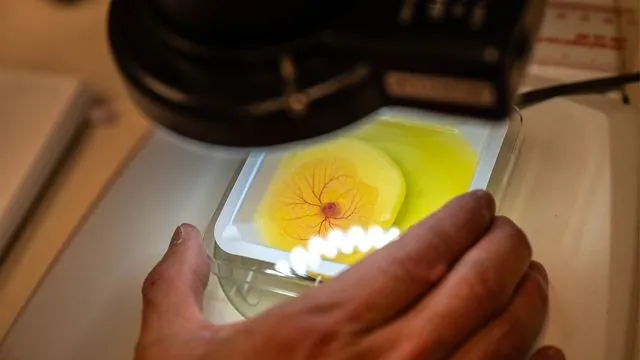
Proteomics is Revolutionizing Personalized Cancer Treatment for Kids
2025-04-01
Author: Daniel
Introduction
A groundbreaking team of researchers from Canada is changing the future of pediatric cancer care with an extraordinary new method that involves growing tumor cells in chicken eggs to rapidly identify personalized treatments for young patients.
Led by experts from the University of British Columbia and BC Children’s Hospital Research Institute, this innovative approach marks Canada’s first effort to combine cutting-edge proteomics with traditional genetic methods to pinpoint and test effective drugs tailored to individual cancer cases before the patient even starts treatment.
Their recent success, detailed in the scientific journal EMBO Molecular Medicine, underscores the importance of proteomics — the study of proteins — as a powerful complement to genomics, which has long dominated personalized medicine discussions. Proteomics allows researchers to discover potential weaknesses in tumors that genetic testing may not unveil.
The research is part of a collaborative initiative called PROFYLE (PRecision Oncology For Young peopLE), which is integral to Canada's pediatric cancer network, ACCESS (Advancing Childhood Cancer Experience, Science and Survivorship). This ambitious program unites over 30 research and funding entities and more than 100 scientists nationwide, all dedicated to enhancing outcomes for children and young adults battling cancer.
A Unique Case Study of Hope and Innovation
The study's co-lead authors, Dr. Georgina Barnabas and Tariq Bhat, were focused on a specific patient with a rare pediatric cancer that was resistant to conventional treatments. Traditional chemotherapy and genomics had failed to yield a viable treatment option, putting the patient’s life in jeopardy. However, by pivoting to proteomics, the research team uncovered a critical metabolic vulnerability in the tumor, specifically noting its reliance on an enzyme called SHMT2.
"Its weakness was hidden using genomics alone," explained Dr. Lange, one of the senior researchers involved. "By exploring the proteins of the tumor, we pinpointed a potential target for treatment using an already approved drug." Their strategy involved repurposing sertraline, commonly known as an antidepressant, to inhibit SHMT2, effectively cutting off the tumor's energy source.
Innovative Testing with Chicken Egg Tumor Hosts
In a fascinating twist, the researchers utilized chicken eggs to grow an exact replica of the patient's tumor, enabling them to observe how the tumor would respond to the identified drug in a matter of weeks. This method greatly accelerates the timeframe typically required to evaluate treatment options, offering a lifeline to patients in similar critical situations.
"This technique allows us to quickly validate whether the drug identified through proteomics is effective," said Dr. Lim, a senior investigator in the project. The egg-based tumor model is part of the BRAvE initiative (Better Responses through Avatars and Evidence), which connects clinical practices with research laboratories to enhance cancer treatment strategies.
Upon assessment of the results, the PROFYLE expert panel concluded that sertraline was the most promising treatment option for the patient, presenting a glimmer of hope.
Encouraging Results and Future Aspirations
While the findings from this groundbreaking research were encouraging — showing slowed tumor growth— unfortunately, they did not result in a full cure. Nevertheless, Dr. Lange remains optimistic: "We recognize there is still much more to do, but this study proves our approach can provide timely and personalized treatment recommendations for patients with rare and difficult-to-treat cancers."
With ambitions to expand their innovative method across the nation, the team hopes to identify effective treatments even faster for children with severe cancer diagnoses, paving the way for a brighter future in pediatric oncology.
This revolutionary approach underscores a pivotal moment in cancer treatment, where precision medicine meets cutting-edge research, offering tantalizing possibilities for better outcomes for young cancer patients everywhere. Stay tuned as this ground-breaking work continues, potentially reshaping how we approach childhood cancer treatments for years to come!
Follow us for more updates on the latest advancements in cancer research and treatments!


 Brasil (PT)
Brasil (PT)
 Canada (EN)
Canada (EN)
 Chile (ES)
Chile (ES)
 Česko (CS)
Česko (CS)
 대한민국 (KO)
대한민국 (KO)
 España (ES)
España (ES)
 France (FR)
France (FR)
 Hong Kong (EN)
Hong Kong (EN)
 Italia (IT)
Italia (IT)
 日本 (JA)
日本 (JA)
 Magyarország (HU)
Magyarország (HU)
 Norge (NO)
Norge (NO)
 Polska (PL)
Polska (PL)
 Schweiz (DE)
Schweiz (DE)
 Singapore (EN)
Singapore (EN)
 Sverige (SV)
Sverige (SV)
 Suomi (FI)
Suomi (FI)
 Türkiye (TR)
Türkiye (TR)
 الإمارات العربية المتحدة (AR)
الإمارات العربية المتحدة (AR)